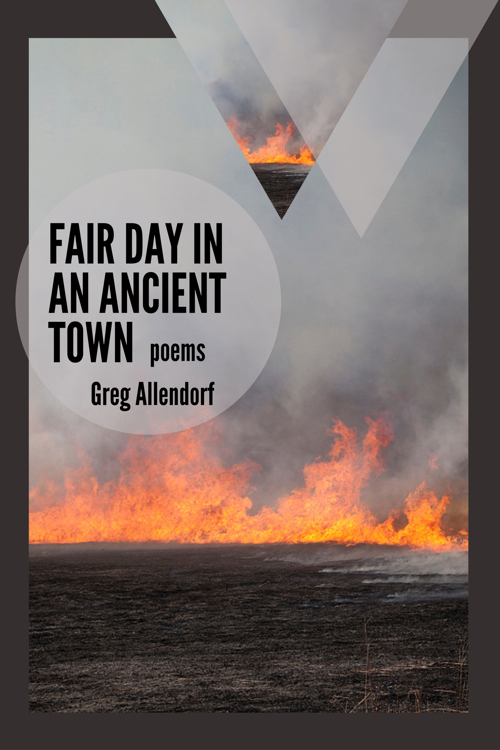
Crass, glossy, glittering and polished; Greg Allendorf’s first book of poetry published by Brain Mill Press is a trip simultaneously through a dank nightclub and a field of wheat at dusk. “Fair Day in an Ancient Town: Poems” is the third book in the Mineral Point Poetry Series, and I only wish I’d bought all three because if the first two books are as witty as this one, I will definitely need them in my collection. Allendorf constantly juxtaposes the refined and the obscene, the bawdy and yet heart-breakingly intimate. The keen use of form often hearkens to the early pastoral, and each poem feels like a goodbye. If you’ve ever spent a day inside a waiting room looking out on a grassy hill and thinking about having sex later, this book is for you.
I wanted to spend time with some LGBTQ+ inclusive poetry, something queer and also exciting, and when this book popped up under Amazon’s most recent I looked over the summary and promptly added it to my Kindle library. The collection is succinct, but it feels like expert love-making: every second leaves time stretched and distended.
“Nota,” the first in the collection, creates a model with which to read the following poems, flaunting carefree repetition and calling to its own nature as a poem, confined to the page and limited by its form:
“I did the love and dressed for my scant part
in the love. As I escape my cheap
dress shirt, crystal flies embellish me.
Make of my blue aura a dark mark,
like a laurelled editor would make.
Save me from the fact of punctuation.
It daubs a deeper blue over the wrist,
arrests the jaw beneath a wet stop sign;”
“Nota” functions as a kind of introduction, leading us slowly into the world which the poem inhabits, where the everyday becomes drenched in finery. The enjambment between the first two lines, “I did the love and dressed for my scant part / in the love” feels like a gasp for breath, or a pause for clarification, and mimics the way an actor trained in Shakespearian form would deliver their lines: dramatic, yet carefully constructed to draw the audience in for the juicy conclusion. The speaker steps out of their costume, and the speaker wants the reader to understand that this persona, this moment in time is being embellished, just as the speaker was embellished.
I revel in the brutal honesty of Allendorf’s syntax, because every poem encases some sordid moment in time, something the reader feels like they are watching from across the bar or from between stalks of tall grass. “We Will Become One in Luxor” describes a trip between the speaker and a lover spent in Las Vegas, and instead of pointing to the artificiality of the setting, the lights and the chimes of the slot machines in the casino, Allendorf beckons us to the desert, where the two lovers spend their time in one another. In the following section, we hear the speaker’s desperation and need to be with their lover in this stark landscape:
“I will love you.
We will go to Luxor.
We will go to Luxor and we’ll lie
with one another there over the miles
of desert.
Of desert we will sup. We will cup
each other’s chins and breasts and we will burn
like fat-cells. And, like fat-cells, we will flood
each other’s limbs and livers. With our love
will come a flood of fluids and of clouds.
I will ride you.
I will ride you through Luxor deserts.
I will ride you
and I’ll love you and we’ll live
in Luxor on some twelve square feet of sand.”
Allendorf’s poetry is at times painful, but the brutality of his poetry allows the reader to really revel in the sensory detail. Allendorf’s “Paean,” named for a song recounting joy or triumph, allows the reader into a close confidence with the speaker, like the trust of a dear friend. “I dreamt that you were not an idiot. / Your lids held the same green stones, / cheeks the same cute bloat. I lived alone, / spied on you while you loafed on the strand.” The repetition of sounds , the long “o” especially, mimic a laziness you can feel as it washes over you. The speaker is hard to read, and that complexity of narrative voice follows through in the rest of the poems. I don’t know whether the speaker is fond of the lazy lover, annoyed, or resigned, but I love the way Allendorf encompasses the wide span of human emotion without sounding vague or essentialist.
This collection is sure to leave you coming back, day after day, for the unique images and emotive quality of the poetic voice. Among my favorite phrases is the “piss-tinted amaryllis” described in the second poem, “Cri de Coeur.” I adore the combination of harshness with the beauty of nature. Lines and phrases like these are what Allendorf excels in, and I for one can’t wait to see more from this author.
Reviewed by: Nicole Pero
